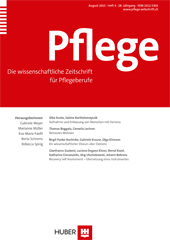Recovery Self Assessment – Übersetzung und kulturelle Anpassung eines recovery-orientierten Einschätzungsinstrumentes
Abstract
Zusammenfassung. Hintergrund: Der Recovery-Ansatz gewinnt in der psychiatrischen Forschung und Praxis zunehmend an Bedeutung. Im englischen Sprachraum ist die praktische Etablierung und wissenschaftliche Auseinandersetzung fortgeschritten. Um die Implementierung des Ansatzes zu unterstützen, sind Einschätzungsinstrumente notwendig. Ein verbreitetes und anerkanntes Instrument ist die Recovery Self Assessment Scale (RSA). Diese besteht aus vier Versionen eines Fragebogens, welche die Perspektiven von Nutzenden, Fachpersonen, Angehörigen und dem Management erfassen. Ziel/Methode: In diesem Artikel werden die Entwicklung des Instrumentes und der Übersetzungsprozess dargestellt. Zwei voneinander unabhängige Arbeitsgruppen verwendeten unterschiedliche Übersetzungsverfahren: Die Arbeitsgruppe aus der Schweiz (AGS) orientierte sich an den ISOR-Prinzipien, die Arbeitsgruppe aus Norddeutschland (AGN) an den Richtlinien des European Social Survey Programme zur Übersetzung von Fragebögen – TRAPD. Die Methoden unterscheiden sich darin, dass die TRAPD Fokusgruppen vorsieht. Die Ergebnisse der Arbeitsgruppen wurden mittels eines Konsensusverfahrens zur RSA-D zusammengeführt. Ergebnisse: Bei der Übersetzung und kulturellen Anpassung der RSA-D wurde die Nähe zum theoretischen Bezugsrahmen der RSA gewahrt und die Übertragbarkeit in den deutschsprachigen Kontext berücksichtigt. Schlussfolgerung: Bevor die RSA-D in der Praxis und Forschung eingesetzt werden kann, sollte in weiterführenden Studien die psychometrische Testung erfolgen.
Abstract. Background: The recovery approach is becoming increasingly important in mental health services and research. In English-speaking countries, its practical implementation as well as the scientific discussion is far more advanced. To support the approach, assessment instruments are required. A widespread and recognised tool is the Recovery Self Assessment Scale (RSA). This includes four versions of a questionnaire, which cover the perspectives of users, providers, family members and management. Aim/Method: In this article, the development of the instrument and the systematic translation process are presented. Two independent research groups applied different translation-methods: The Swiss research group (AGS) used the ISOPR principles, the German research group (AGN) the Guidelines of the European Social Survey Programme for survey translations TRAPD. The methods differ in the fact, that TRAPD uses focus groups. The results of both groups were combined by means of a consensus process. Results: Within the translation and cultural adjustment of the RSA-D, the theoretical framework of the RSA as well as the transferability into the German-speaking context has been ensured. Conclusion: Before the RSA-D can be used in practice and research, further studies towards psychometric testing should be conducted.



